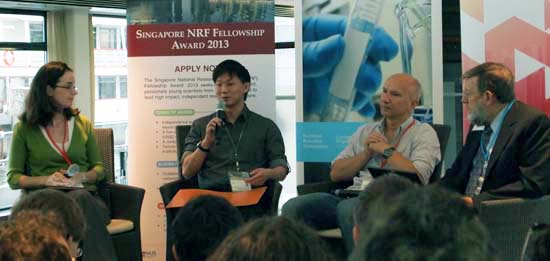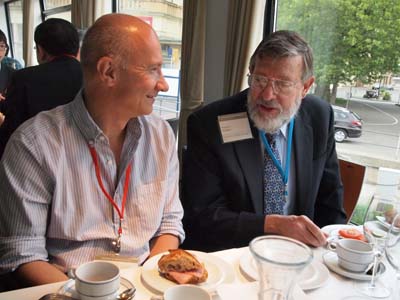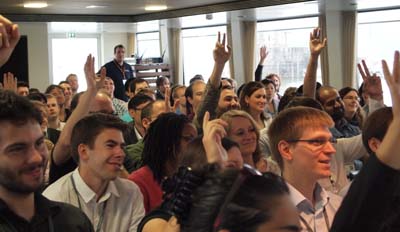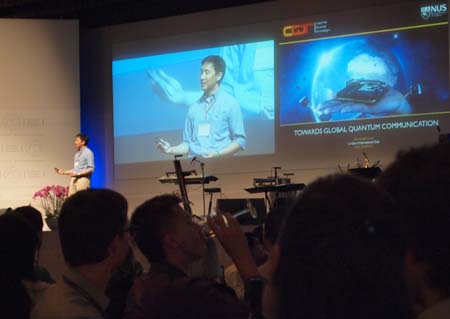Highlights
Singapore showcased at Nobel Laureate Meeting
Young researchers and Nobel Prize winners attending the 62nd Lindau Nobel Laureate Meeting in Germany were treated to a Singapore spectacular on 2 July: the country's culture, food and research were on show as Singapore hosted the meeting's international day for the first time. Research at the Centre for Quantum Technologies was highlighted in events that started and closed the day at the physics-focused meeting. For the story in pictures, visit CQT's album on Facebook.

The science breakfast on quantum technologies, held on a boat in Lindau harbour, was a panel discussion featuring CQT researchers and a Nobel Laureate. From left to right are the moderator Jenny Hogan (CQT outreach manager) and speakers Colin Teo (CQT Phd Student), Artur Ekert (CQT Director) and Bill Phillips (Nobel Laureate in Physics, fellow at NIST and the JQI).


Audience members answer a question from the panel: how many of them had heard of Bell's Inequalities before the discussion?
The Lindau Nobel Laureate Meeting brings some of the world's brightest young researchers together with Nobel Laureates for a week of lectures, discussion and social events. This year's event involved 580 young scientists — including CQT PhD student Colin Teo, one of eight young researchers selected to attend from Singapore — and 27 Nobel Prize winners in physics.
Also attending the 2012 meeting was Singapore President Dr Tony Tan Keng Yam. He was made a member of the Lindau Foundation Honorary Senate and announced that Singapore would host in January 2013 a Global Young Scientists Summit inspired by the Lindau spirit.
At 7am on the international day, Colin was anxiously awaiting the meeting's opening scientific event. He was to be the first speaker in the science breakfast "On the brink of an era of quantum technologies". After him, CQT's Director Artur Ekert and 1997 Nobel Laureate William D. (Bill) Phillips would speak. "I was scared before, then terrified when I saw the stage", said Colin. But he delivered his talk about Bell's inequalities and the effort to perform loophole free tests of the inequalities calmly and clearly.
Artur spoke about quantum cryptography, explaining how he came as a PhD student to propose a scheme to use entangled photons for secure communication. He also described how other researchers have since shown the idea to be cleverer than he anticipated, proposing schemes that could guarantee secure communication even if the equipment is bought from an untrusted source. Bill, a fellow at the United State's National Institute of Standards and Technology and at the Joint Quantum Institute, who shared the Nobel for the development of techniques to cool and trap atoms, talked about qubits. He explained some of the physical systems that might be used to implement ideas from quantum information theory. The session was moderated by CQT outreach manager Jenny Hogan.
Excellent questions from the audience of young researchers included asking for an opinion on when we might have quantum computers. Bill Phillips's prediction: there is a 50:50 chance of having in 50 years a quantum computer that can outperform — eg, at factoring large numbers — its contemporary classical computers.
In the evening, Singapore hosted a dinner that gave meeting participants the chance to sample Singapore food favourites. Before the meal, presentations and videos highlighted Singapore's research infrastructure and its tourist sights. Dr Tan gave the opening speech. Artur, not only CQT's Director but also Lee Kong Chian Centennial Professor in the National University of Singapore (NUS) and Professor in Quantum Physics at the University of Oxford, spoke next. He explained why he found Singapore an excellent place to be a scientist and encouraged the young researchers to visit to see "the future" for themselves. Then it was the turn of CQT Principal Investigator and NUS Assistant Professor Alexander Ling: he presented his project to perform a quantum entanglement demonstration in space.

CQT Principal Investigator Alexander Ling gave the talk "Towards Global Quantum Communication" at the evening get-together hosted by Singapore.
Quantum-secured communication has been demostrated over distances up to 144km. One vision to extend the reach of entanglement-secured communication is to put the source of entangled photons in space, and various collaborations around the world are working towards this goal. Alexander explained his team's strategy to take small steps: first demonstrating that it's possible to put a working quantum entanglement source on a satellite, then working out how to distribute entangled photons to ground stations and between satellites. The team are pursuing the relatively low-cost strategy of flying their experiment on a "CubeSat". Alexander described the challenges of shrinking a quantum optics lab to fit in the 300ml available on such satellites for science experiments — 300ml is smaller than a can of Coca-Cola.
Alexander also told some of his personal story: explaining how his father, a welder, had first inspired his interest in physics. Alexander, born in Brunei, was able to do his undergraduate physics degree at the National University of Singapore (NUS) thanks to a private scholarship, the Goh Keng Swee scholarship. He then did a PhD at NUS, went to the United States for a postdoc, and returned to Singapore where he is now an Assistant Professor at NUS and Principal Investigator at CQT.
After the speeches, Dr Tan thanked Artur and Alexander for their presentations. In a press briefing the following day, the President told reporters that Singapore needed more home-grown science talents like Alexander. The comments were reported in Singapore newspaper the Straits Times in an article titled "Local talent key for growth in science".
CQT thanks Singapore's National Research Foundation, which coordinated Singapore's presence at the meeting, for inviting CQT to participate and supporting the CQTians who attended.






